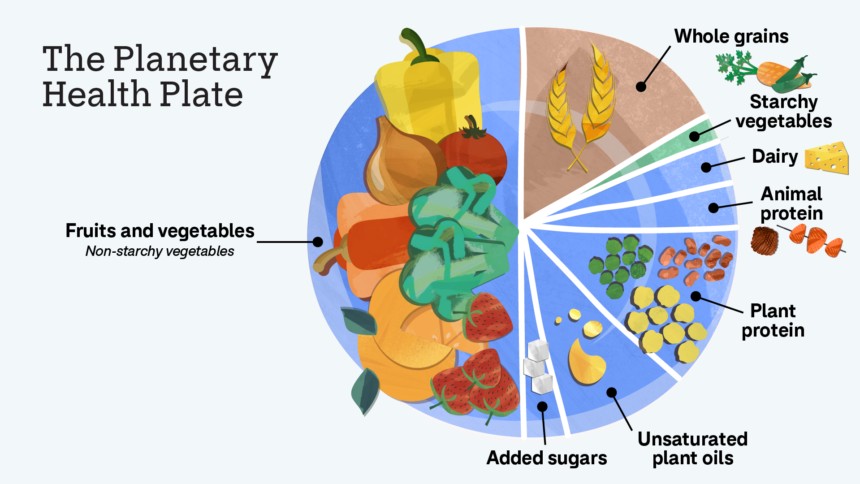Following rising cases of Non-Communicable Diseases caused by collapsing food systems and poor dietary habits, public health advocates canvass adoption of Planetary Health Diet (PHD) to stem ill-health and deaths in Nigeria and global community
By Edu Abade
Just like consumption of tobacco products, processed foods, sugar sweetened beverages (SSBs) and other harmful products have been identified to cause a number of ailments, especially non-communicable diseases (NCDs), food insecurity exacerbated by collapsing food system and poor dietary habits have had their negative toll on Africa and global public health.
To that extent, public health advocates-Foodjuctice and the Renevlyn Development Initiative (RDI) have canvassed the adoption of Planetary Health Diet (PHD) as the way out of the deteriorating health system in Nigeria, Africa and the entire world, insisting that only healthy diets and lifestyle could save mankind from ill-health and death.
Executive Director of RDI, Philip Jakpor, who spoke at an introductory training on planetary health diet for officials of federal and Lagos state government expressed the hope that the idea of planetary health diet was conceived with Foodjustice with focus on ministries of government was capable of fostering change in the food system and dietary patterns.
“Planetary health diet is a scientifically-backed dietary pattern designed to be healthy for individuals and sustainable for the planet, with emphasis on plant-based foods and reduction of consumption of red meat and processed foods. It reflects the intersections between what we grow, the ecosystem under which they grow and the positive outcomes when we consume them.
“As the discourse and clamour for adoption of this dietary pattern continues to grow globally, Africa is largely missing in the scheme of things even as the continent grapples with the devastating impacts of malnutrition and the health challenges associated with consumption of an unwholesome diet. Non-communicable diseases are a significant cause of deaths in Africa,” he stated.
Explaining that the training resulting from an earlier simulation exercise by RDI following the adoption of plenary health diet in Mexico and other countries, Jakpor noted that in Nigeria, NCDs account for about 30 percent of annual deaths and studies have shown that they are responsible for more illnesses and deaths than infectious diseases. He added that in 2020, NCDs were responsible for 617,300 deaths in Nigeria, with 22 percent of these being premature deaths of persons between ages 30 and70.
“Our people, including the young, are dying from cardiovascular diseases, cancers, chronic respiratory diseases, and diabetes. These are illnesses that were unheard of on the continent before now but they now account for the huge death burden across the continent due to urbanization, lifestyle changes and socioeconomic issues. But we must not only reel out disturbing statistics. The task of addressing these challenges must start with proper understanding of the issues, backed by the readiness to embrace proven solutions that are science-based.
“This is why we assembled resource persons including a Nigerian pediatrician and experts from Mexico to share the practical realities before us, the situation in their country and how they successfully mainstreamed planetary health diet into their agriculture and education systems,” he stated.

The training, which was moderated by Jakpor and Dinah Stratenwerth of Foodjustice, featured Dr. Makoyawo Olayinka, who spoke on the Importance of Planetary Health Diet In Children, noting that in 2019, EAT-LANCET commissioned a consortium of experts from 16 countries after which a report introducing the concept of Planetary Health Diet also known as the EAT-LANCET Diet was released.
She explained that the report stressed the critical role that diets play in human health and environmental sustainability, advocating a unified global approach to transferring food systems. It aims to optimize human health while considering environmental impact.
Olayinka pointed out that PHD supports optimal growth and development in that such diets are rich in essential minerals like vitamins, minerals and fibers, which are vital for children’s growth and development just as vitamins and minerals from fruits, vegetables and other plants-based sources support the immune system and help children fight infections.
“PHD improves learning and cognitive skills to the extent that nutrient-rich food like omega B3 from seeds and fish and vitamin from whole grain also support brain function and concentration as well as reduces the risk of chronic diseases like heart disease, type 2 diabetes and certain types of cancer later in life.
“It boosts stronger bones and muscle in the sense that essential nutrients like calcium and protein found in abundance in PHD are vital for building strong bones and supporting muscle function. It also prevents malnutrition and diet related illness because balancing calories and nutrients prevent both undernutrition and over-nutrition (obesity),” she stated.
On the benefits of PHD to the planet, she said it contributes significantly to climate change mitigation through reduction of greenhouse gas emissions from food production is crucial in addressing climate change and plants-based diets, as well as biodiversity conservation, while lack of PHD causes obesity, hyperactiveness (ADHD), learning disability, vitamin deficiency (blindness), type 2 diabetes, chronic illness (cardiac), long-term risk for cancer such as colorectal cancer, liver and pancreatic cancer.
To achieve this goal, family-level intervention and school meal programs play a pivotal role. These are supported by educational initiatives promoting balanced meal planning, the efficient use of plant based protein sources and strategies to introduce sustainable dietary practices early in life.
In his presentation on What Is Planetary Health Diet, Percival Agordoh of the University of Health and Allied Sciences, Ghana, lamented that Afrixa’s current food systems are not only harming the people’s health, but also pushing the planet to its environmental limits, adding that PHD links a person’s diet to the health of the planet as it focuses on foods that are both sustainable and good for your health.
Agordoh, who maintained that the PHD’s goal is to create a sustainable food system that supplies healthy and nutritious food to a growing population, revealed that unhealthy dietary patterns drive $8 trillion in annual costs of global agrifood systems, stressing that although the challenges were daunting, they were surmountable.
“Planetary Health Diet offers a viable pathway towards creating food systems that are both healthy and sustainable. African countries urgently need to work together to address the challenges of unsustainable food systems. By embracing the Planetary Health Diet, we can nourish people and the planet for generations to come,” he said.
He canvassed strong actions to promote the Planetary Health Diet and create a healthier, more sustainable future combined with making informed food choices, supporting sustainable food systems and advocating for policies that promote planetary health
In her presentation on Health Impact of the Mexican Healthy and Sustainable Dietary Guidelines on Mortality by Socio-demographic Characteristics in Adults, Andrea Arango Angarita of the Mexican National Institute of Public Health recommended high intake of fruits, vegetables, legumes, whole grains, nuts and seeds.
She recommended a significant reduction in red and processed meat, moderate consumption of dairy and eggs according to preference, as well as elimination of sugar-sweetened beverages and ultra-processed foods (except sweeteners).
Agarita explained that adopting the Mexican Healthy and Sustainable Dietary Guidelines (MHSDG) could significantly reduce between 29.6-31.9 percent of deaths for chronic disease in Mexican adults.
According to her, adopting the MHSDG could significantly reduce CVD mortality in Mexico, particularly in northern and urban areas, adding, “Public health efforts should prioritize increasing plant-based food, intake, among women, while targeting SSB and UPF reduction in men, tailoring dietary guidelines to socio-demographic factors is crucial to maximize their effectiveness.”
On her part, Head, Department of Maternal, Child and Adolescent Nutrition, Instituto Nacional de Salud Pública (INSP) México, Mishel Unar Munguia said for the first six months of life, babies need only breast milk (or exclusive breastfeeding) and then other nutritious and varied foods until at least two years of age.
“For adults, we should add more fresh fruits and vegetables in all our meals. Those that are in season, which are more affordable and whenever possible, those that are locally produced. Let’s eat beans, lentils, or broad beans daily, prepared as stews, soups, or with vegetables. They’re rich in protein and fiber just as they are convenient and economical.
“Let’s eat less beef and processed meats. Instead, let’s eat more beans, lentils, eggs, chicken, or fish. For our health and that of the planet, let’s choose more plant-based foods. We should avoid ultra-processed foods such as sausages, chips, cookies, sweet bread, and boxed cereals, as they are high in fat, salt, and (or) sugar. Choose foods without labels or with as few labels as possible.
Let’s drink natural water throughout the day and with all our meals, instead of sugary drinks such as sodas, juices, powdered water, and sports drinks, which can harm our health. Let’s avoid alcohol consumption. For the well-being of our physical and mental health and that of our families let’s do more physical activity like walking, running, or dancing, instead of spending time sitting or in front of a screen (cell phones, television, video games, etc.). Every movement counts! Let’s enjoy our meals with family or friends whenever possible. Let’s all participate in meal planning and preparation, avoiding food waste,” she stated.
Munguia expressed the hope that the MHSDG would adequately inform, guide and align policies, programmes and legal instruments related to food and health in Mexico; as well as a nutritional guidance tool that helps the population move toward healthier and more sustainable eating and physical activity patterns.
“This will help reduce the risk of malnutrition and chronic diseases, preserve Mexican food culture, protect our biodiversity, and contribute to the sustainability of the planet,” she added.



